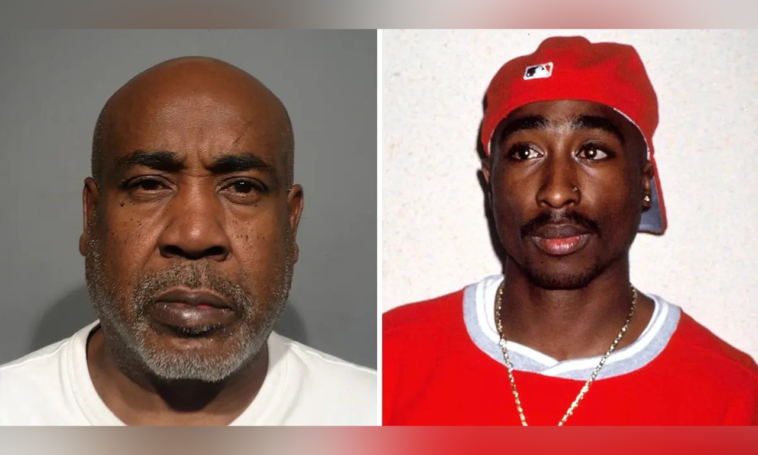New developments in the case against Duane “Keefe D” Davis, the suspected mastermind of Tupac Shakur’s 1996 assassination plan, raise witness safety worries. Prosecutors are investigating jailhouse talks where coded language, including “green light,” raised concerns about potential threats to informants.
Channel 13 recorded a Davis-son call after his Henderson arrest last September. Davis’ son calls to say “a green light” has been provided, using coded language prosecutors suspect authorizes murder.
“The phone call shows that our client, Mr. Davis, does not threaten any witnesses. We believe his son warned him about a threat to him and his family.” – Clark County Chief Deputy Special Public Defenders Charles Cano and Robert Arroyo
Duane Jr.: People in the city say we have a green light.
Davis: We? A green light?
Duane Jr.: “Yes. Wartime rearing, they said. We don’t care.
A “green light” in Davis often authorizes aggression, which could endanger witnesses, according to prosecutors.
In gang investigations, retired Metro detective Phil DePalma stressed the necessity of deciphering specific language. He said, “Gang intelligence is crucial. The jargon and codes they employ to hide from law police are real.”
Davis’ defenders dispute the prosecutors’ view. They say the jailhouse call order was against Davis and his family, not witnesses. Charles Cano and Robert Arroyo, Clark County Chief Deputy Special Public Defenders, said ABC News, “Our client, Mr. Davis, does not threaten any witnesses in the phone call. We believe his son warned him about a threat to him and his family.”
Davis was concerned about his proffer interview words: “I still feel like I could go to jail with that because this is federal.”
Davis was persuaded by retired LAPD detective Greg Kading that his proffer session statements could not be used against him. The proffer deal will likely influence the trial.
Jailhouse call code complicates legal proceedings. Concern for witness safety highlights the difficulties of prosecuting high-profile cases with complex gang affiliations, underlining the need to examine coded communication in these areas.
Intercepted jailhouse calls have complicated the Duane “Keefe D” Davis case. These communications’ coded jargon highlights law enforcement and prosecutors’ difficulties comprehending gang communication.
The jailhouse call’s “green light” sparked concerns, with prosecutors concerned for Tupac Shakur murder plot witnesses’ safety. A “green light” in gang language authorizes violent acts, making it crucial to the inquiry.
Davis’ 2007 Los Angeles police interview in which he confessed to arranging Tupac Shakur’s murder adds to the legal drama. This confession under a proffer agreement raises legal problems about Davis’s admissions and their impact on the trial.
The proffer deal is expected to play a major role in the future trial, highlighting the delicate balance between accurate confessions and fairness. Investigators noted Davis’s recent confession in interviews and memoir as crucial to his detention, emphasizing the importance of self-incriminating comments in court processes.
The court’s consideration of Davis’s case highlights the importance of witness safety in high-profile gang prosecutions. The difficulties law enforcement and prosecutors confront in protecting witnesses who provide vital information highlight the necessity for robust witness protection.
The jailhouse call’s varied meanings show how subcultures interpret coded language. It also highlights law enforcement’s efforts to reconcile gang communication with the defense’s claims of misinterpretation.
Despite these legal complexities, prosecutors’ worries for witness safety highlight the need to safeguard law enforcement cooperators in gang-related prosecutions. Police struggle with witness intimidation and retaliation in their pursuit of justice.
Duane “Keefe D” Davis’s $750,000 bond and not guilty plea set the stage for a trial that will examine gang-related crime, witness protection, and the delicate balance between confessions and accused rights.
As the case progresses, it illustrates the criminal justice system’s struggles to confront gang-related crimes. Nuanced interpretation of coded language, dependence on confessions under proffer agreements, and continuous witness safety initiatives all contribute to the increasing discourse about legal reform in gang-related cases.





2 Comments
Leave a Reply2 Pings & Trackbacks
Pingback:Judge Orders Release of Additional Racist Texts by Former San Jose Police Officer
Pingback:2Pac Murder Suspect Keefe D Denied Release Despite Wack 100 Posting Bail - Hard Knock News
Join the Community and Be a Part of the Conversation
You must be logged in or registered to post a comment.